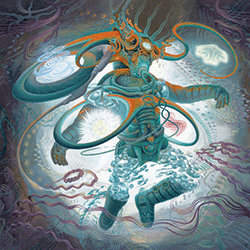Whether you worship them or can’t get past the singer’s highpitched voice, there’s one thing that’s undeniable: Coheed and Cambria are one of the most unique rock bands to achieve any sort of mainstream success.
With sprawling, science fiction themed concept albums and a sound that marries elements of progressive rock, post-hardcore, and heavy metal, Coheed and Cambria’s ambitions have pushed them past the point of being a typical rock band, with fantastic albums like “In Keeping Secrets of Silent Earth: 3” and “Good Apollo I’m Burning Star IV: From Fear Through the Eyes of Madness” operating on a level of epic that most bands only dreaming of ever reaching.
Recently, however, Coheed have been falling somewhat short of delivering these ambitions in the ways that they used to. With their last album, 2010’s “Year of the Black Rainbow”, contained some good ideas but ultimately falling short of the majesty of their previous releases.
However, with news of a planned double album known as “The Afterman” to be released in two thematically differing parts, there seemed to be hope that Coheed could once again reclaim their position as gods of epic scifi rock. Now that the first part, “The Afterman: Ascension,” has been released, does the album prove that Coheed are living up to this possibility?
I wish I could say it does, but unfortunately, that’s not the case. While “The Afterman: Ascension” has a few songs that seem to be headed in the right direction, they are ultimately sabotaged by the albums abundance of unnecessary details and overall weak lyricism, among other things.
Admittedly, the album kicks off to a decent start. The first two tracks introduce the album the same way Coheed has introduced nearly all of their albums: The brief piano melody of “The Hollow” leads into the albums raging epic “Domino the Destitute.” These tracks, especially the latter, do their best to exhibit Coheed in full fighting form, with “Domino’s” metallic riffs, progressive jams, and dramatically shifting parts reaching back to the grandscale sound they perfected on the “Good Apollo” albums.
Unfortunately, these two tracks, along with many others on the album, end up suffering due to the inclusion of random, unnecessary additives that stick out like pock marks throughout the album. What could possibly derail the serene delicacy of “The Hollow” more than the obnoxious, bewildering robot voices that impose their presence over the track like a person who talks during a movie? Their appearances throughout the album are typically brief, but they are unwarranted and distracting enough to totally divert the listener’s attention from the music.
The following track, “The Afterman,” proves to be the album’s strongest track by dealing in patience rather than bombast. Built on a twinkling guitar line and atmospheric production, the song is incredibly delicate and well layered, with violins and distorted guitars being subtly introduced at just the right moments to carry the song far without overdoing it.
From this point on, however, things really begin to slope downhill for “Ascension.” The following two tracks, “Mothers of Men” and “Goodnight, Fair Lady”, aren’t horrible per say, but present themselves more as Coheed operating in autopilot mode. From the hard rock stomp of the former to the bubblegum pop of the later, these tracks reveal ideas that Coheed have presented with more success in the past, as “Goodnight” in particular doesn’t hold a candle to previous pop standouts like “A Favor House Atlantic” or “The Suffering.”
“Goodnight, Fair Lady” and various other tracks also suffer greatly due to another culprit: weak lyricism. Lyrics have always been a big part of Coheed’s appeal whether or not you cared to learn the albums stories (I would get more into it, but that would require a whole other article to explain), as they’ve always managed to write in such a clever and descriptive way that the specifics didn’t matter.
On “The Afterman: Ascension,” however, it rarely even sounds like they’re trying, as otherwise decent songs get bogged down by poor lyrical choices. “Goodnight, Fair Lady”, for instance, opens with the horribly cliché line, “Good evening, ladies and gentleman / I have a story to tell you of a once lonely night,” which, followed by a chorus that manages to say almost nothing, shows a serious lack of inspiration.
Two later tracks, “Vic the Butcher” and “Evagria the Faithful”, also find themselves marred by poor lyrical content, despite being two of the more fully realized tracks sonically. “Vic the Butcher,” for instance, features a grandiose sound and an explosive chorus that makes it otherwise enjoyable, but lyrical duds like “You’re the prettiest thing I’ve ever seen / Come with me, I want to make you dirty” are cringe worthy to say the least. Not to mention, the horrible robot dialog discussed earlier makes a significant appearance around the tracks end, making you almost regret listening that far into the song.
While it may be possible to forgive some of the albums various flaws, there is nothing forgivable about “Hollywood the Cracked,” the albums biggest blunder and easily the worst song Coheed has ever put to tape. I’d love to say something redeemable about it, being a big fan of the group, but I could not even lie to make this song sound better. The lifeless, half-assed metal riffs meant to carry the song have no personality whatsoever, the songs subject matter (a girl named Holly Wood who’s crazy and does bad things) is incredibly weak by Coheed’s standards, and the 30-second spasm of sound effects that close the track is just baffling.
Worse yet are the lyrics. I don’t know how Coheed thought lines such as “Holly Wood Holly Wood / F**king a loaded gun” and “She’s a few cards short of a deck, a joker in the game” were clever in any way, but these are honestly some of the most immature and vomit inducing lyrics the group has ever written. Seriously Coheed, what were you thinking?
Many people have been hoping that “The Afterman: Ascension” would be a return to form for Coheed and Cambria, but unfortunately, “Ascension” still proves to be more of a misfire than a direct hit. Of course, we still have part two to look forward to in “The Afterman: Descension,” but after what we’ve just experienced, I won’t be holding my breath.
IMAGE TAKEN from play.com




